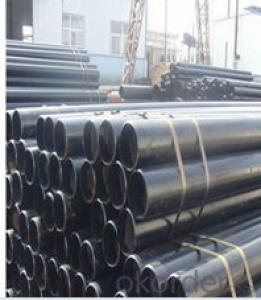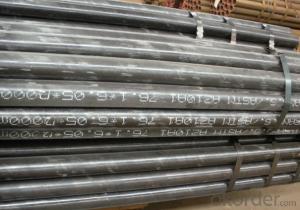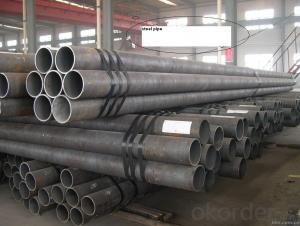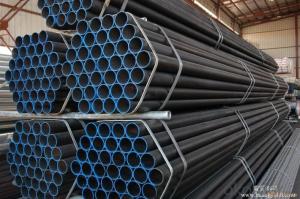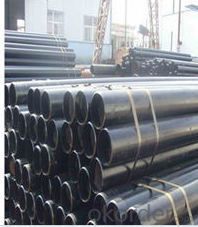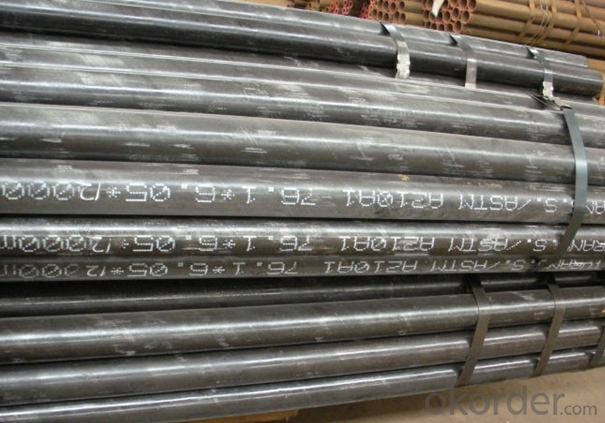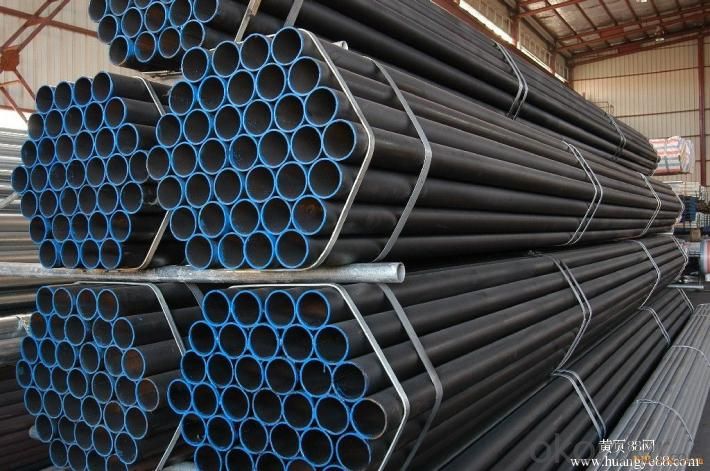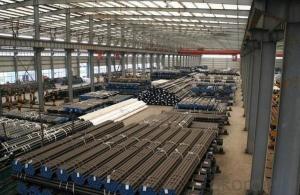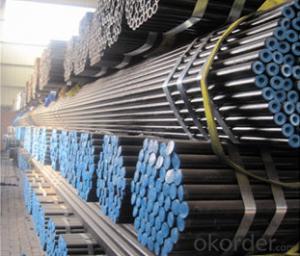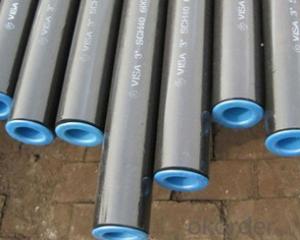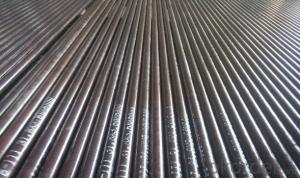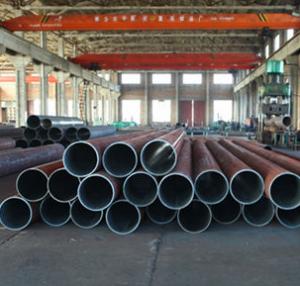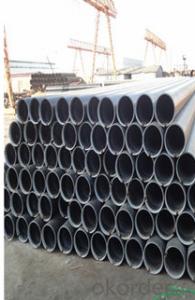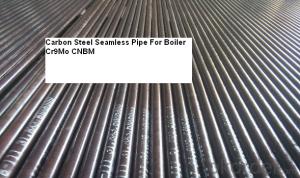High-quality Carbon Seamless Steel Pipe For Boiler 10# CNBM
- Loading Port:
- Qingdao
- Payment Terms:
- TT OR LC
- Min Order Qty:
- 10 pc
- Supply Capability:
- 30 pc/month
OKorder Service Pledge
OKorder Financial Service
You Might Also Like
Quick Details
| Thickness: | 3 - 60 mm | Section Shape: | Round | Outer Diameter: | 21.3 - 1220 mm |
| Secondary Or Not: | Non-secondary | Application: | fluid pipe,boiler pipe, structural pipe, oil/gas/water pipe etc | ||
| Technique: | Hot Rolled | Certification: | ISO9001-2000, ISO14000, ISO18000 , API 5L | Surface Treatment: | Painted, Oiled, galvanized or phosphate etc |
| Special Pipe: | API Pipe | Alloy Or Not: | Is Alloy | Technique:: | Hot rolled or cold rolled |
| Special pipe:: | API/ ASME/thickwall/oil/gas/water pipe | Length:: | 3-12m | Treatment of two ends:: | Beveled end , plain end etc |
| Brand:: | Bai Chuan | Third Party Inspection:: | BV, SGS etc. | Schedule:: | SCH10-SCH160, XS, XXS |
| Other Material:: | 10#, 20#, 16Mn, Q345 etc | Material Type:: | Carbon steel/ Low alloy steel | Producing standard:: | American/Japanese/ German/ Britain/ Chinese standard |
| Grade: | A53(A,B),A106(B,C),A210,API J55,St37,STPG42,A53-A369,API J55-API P110,ST35-ST52 | Standard: | BS EN10296,JIS G3452-2004 |
1. Out Diameter: | 21.3mm-1220mm |
2. Wall Thickness: | 3mm-60mm |
3. Length: | 3m-12m |
4. Producing Standard: |
|
5. Main Material: (Carbon Steel & Low Alloy steel) |
|
6. Special specifications: | Available according to customer’s requirements and quantity. |
7. End Shape: | Beveled end , plain end, varnished, or adding plastic caps to protect the two ends as per customer’s requirements. |
8. Surface treatment: | Painted, Oiled, galvanized, phosphate etc. |
9. Usage: |
|
10. Certificates: | ISO9001-2000, ISO14000, ISO18000, API 5L certificate |
11. Third party inspection: | Welcome you to send a third party inspecting company (BV, SGS etc) to check the quality of our final products. |
12. Pictures: | our producing flow chart, our factory, production line, inspecting equipments, our products are listed below for your reference. |
- Q: How do you calculate the pipe thermal expansion for steel pipes?
- In order to calculate the thermal expansion of steel pipes, one must take into account the material's coefficient of thermal expansion (CTE), the temperature fluctuation, and the pipe's length. The CTE represents the extent to which a material expands or contracts in response to temperature changes. For steel, the average CTE is typically approximately 12 x 10^-6 per degree Fahrenheit (or 6.5 x 10^-6 per degree Celsius). However, this value may vary depending on the specific grade of steel. Subsequently, the temperature change that the pipe will encounter must be determined. This can be the discrepancy between the operating temperature and the ambient temperature, or the temperature variation caused by the fluid or gas flowing through the pipe. Finally, the thermal expansion can be calculated using the following formula: Thermal Expansion = CTE x Length x Temperature Change Where: - CTE signifies the coefficient of thermal expansion - Length denotes the pipe's length - Temperature Change represents the temperature difference For instance, if a steel pipe has a length of 10 meters (32.8 feet) and experiences a temperature change of 100 degrees Celsius (180 degrees Fahrenheit), assuming a CTE of 12 x 10^-6 per degree Celsius, the thermal expansion would amount to: Thermal Expansion = 12 x 10^-6 x 10 x 100 = 0.012 meters (or 12 millimeters) This means that the pipe would expand by 12 millimeters due to the temperature alteration. It is important to note that this calculation provides an approximation of the thermal expansion. However, other factors such as pipe supports, restraints, and the specific application should also be taken into consideration to ensure the proper design and installation of the steel pipe system.
- Q: How are steel pipes protected against external corrosion in coastal areas?
- Steel pipes in coastal areas are protected against external corrosion through various methods. One commonly used method is the application of protective coatings, such as epoxy or polyethylene, which act as a barrier between the steel surface and the corrosive elements in the coastal environment. Additionally, cathodic protection techniques, such as sacrificial anode systems or impressed current systems, are employed to prevent corrosion by providing a protective current to the steel pipes. Regular inspection and maintenance of these protective measures also play a crucial role in ensuring the long-term corrosion protection of steel pipes in coastal areas.
- Q: Are steel pipes suitable for underground chemical transport?
- No, steel pipes are not suitable for underground chemical transport as they can corrode and react with certain chemicals, posing safety risks and potentially contaminating the transported substances.
- Q: Can steel pipes be used for conveying potable water?
- Yes, steel pipes can be used for conveying potable water. However, it is important to ensure that the steel pipes are coated or lined with suitable materials to prevent corrosion and contamination of the water supply. Regular maintenance and monitoring of the pipes are also necessary to ensure the water remains safe for consumption.
- Q: Can steel pipes be painted or coated?
- Certainly, steel pipes have the capability to undergo painting or coating procedures. It is a prevalent method employed to safeguard them against corrosion, enhance their visual appeal, or comply with particular industry standards. The process consists of an initial step of diligently cleaning the pipes to eliminate any dirt, grease, or rust. Subsequently, a primer is applied, followed by the desired paint or coating. The selection of paint or coating is contingent upon the envisioned purpose of the pipes. For instance, epoxy coatings are frequently utilized for water or wastewater pipelines, while high-temperature resistant coatings are employed for pipes utilized in industrial environments. In conclusion, the act of painting or coating steel pipes has the potential to augment their resilience and overall performance.
- Q: How are steel pipes protected against internal corrosion?
- Steel pipes are protected against internal corrosion primarily through the use of protective coatings such as epoxy or polyethylene. These coatings act as a barrier, preventing contact between the steel surface and corrosive substances present in the transported fluids. Additionally, corrosion inhibitors are often added to the transported fluids to further reduce the likelihood of internal corrosion. Regular inspections and maintenance are also carried out to identify any potential corrosion issues and address them promptly.
- Q: What are the different types of steel pipe coatings for offshore applications?
- There are several types of steel pipe coatings commonly used for offshore applications. These include fusion bonded epoxy (FBE) coatings, polyethylene (PE) coatings, polypropylene (PP) coatings, and three-layer polyethylene (3LPE) or polypropylene (3LPP) coatings. Each coating has its own unique properties that make it suitable for specific offshore conditions and requirements.
- Q: What is the cost of steel pipes compared to other piping materials?
- The cost of steel pipes compared to other piping materials can vary depending on factors such as the size, grade, and specifications of the pipes, as well as market conditions and location. In general, steel pipes tend to be more expensive than some alternative piping materials such as PVC (polyvinyl chloride) or HDPE (high-density polyethylene). However, when compared to other materials like copper or stainless steel, steel pipes can often be more cost-effective. Steel pipes are known for their durability, strength, and resistance to high pressures and temperatures, making them suitable for various applications such as oil and gas pipelines, plumbing systems, and structural supports. Their longevity and reliability can offset the initial higher cost, as they often require less maintenance and have a longer lifespan than other materials. Additionally, steel pipes are readily available in different sizes and grades, making them versatile and adaptable to different project requirements. This availability and versatility can contribute to their cost-effectiveness, as they can be easily sourced and customized to specific needs. It's important to note that prices for steel pipes can fluctuate due to market conditions and factors such as raw material costs, transportation expenses, and labor charges. Therefore, it is advisable to consult with suppliers or industry experts to get accurate pricing information for steel pipes based on specific project specifications and market conditions.
- Q: Can steel pipes be used for underground utility lines?
- Yes, steel pipes can be used for underground utility lines. Steel pipes are commonly used for various underground applications, including water, gas, and oil pipelines. They are known for their strength, durability, and resistance to corrosion, making them suitable for underground installations where protection against external elements is required. Additionally, steel pipes are often used in areas with high traffic loads or areas prone to natural disasters, as they provide excellent structural integrity and can withstand heavy loads and external pressures.
- Q: How do you calculate the pipe friction loss coefficient for steel pipes?
- The pipe friction loss coefficient for steel pipes can be calculated using the Darcy-Weisbach equation, which takes into account the pipe diameter, length, roughness, and fluid velocity. The coefficient can be determined by dividing the friction factor (obtained from Moody's chart or using empirical equations) by the Reynolds number (calculated using the fluid properties and pipe dimensions).
Send your message to us
High-quality Carbon Seamless Steel Pipe For Boiler 10# CNBM
- Loading Port:
- Qingdao
- Payment Terms:
- TT OR LC
- Min Order Qty:
- 10 pc
- Supply Capability:
- 30 pc/month
OKorder Service Pledge
OKorder Financial Service
Similar products
Hot products
Hot Searches
Related keywords
